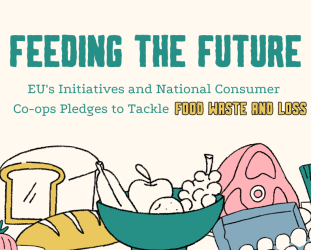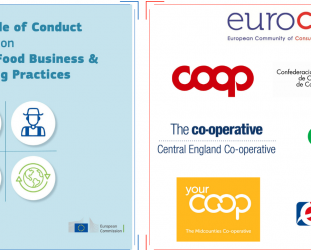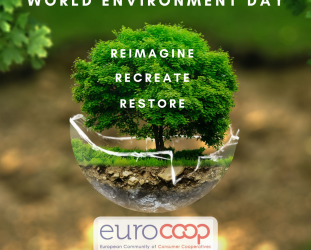Euro Coop’s remarks and recommendations on the proposed Directive on lightweight plastic carrier bags
13.10.2014 07:56:26

Brussels, 8 October 2014
Euro Coop - the European Community of Consumer Cooperatives, would like to put forward by the means of this paper some final remarks and recommendations concerning the proposed EU Directive on lightweight plastic bags. Such Directive is intended to amend the Packaging and Packaging Waste Directive (94/62/EC) and is currently discussed by Member States in the Council of the EU.
By recognising the importance of the above-mentioned waste hierarchy, Euro Coop members have since long taken concrete action to promote more sustainable alternatives to lightweight plastic carrier bags. For several years now, some of our national member organizations have been implementing the so-called “bags for life”. These bags are manufactured by components such as jute and cotton, which are very often Fairtrade certified. This has had a positive impact on consumers’ attitude and, we believe, should be further encouraged and recognised at EU level.
With regard to the specific definition of lightweight plastic carrier bags as “bags made of plastic materials […] with a wall thickness below 50 microns”, Euro Coop would hereby like to object and propose that the definition assumes a lower threshold of 35 microns. Our members – cooperative retailers serving 30 million consumers across Europe, feel that such a parameter is excessively high in describing a lightweight bag. In Euro Coop’s views, a lightweight plastic bag should have a thickness below 35 microns and any definitions with higher parameters should be gradually phased-out for the sake of an increased overall resource efficiency of this product.
Furthermore, Euro Coop would like to underline the role that very lightweight plastic carrier bags have in ensuring food hygiene and protecting (of the goods they carry) during the transportation phase. Yet, we are conscious that they can contribute significantly to pollution and that, ultimately, more sustainable alternatives are needed. In this regard, Euro Coop calls for more research and casts doubts on their proposed substitution with recycled paper carrier bags. This is because there is still no EU legislation that regulates the suitability of the latter in terms of physical contact with foodstuffs, including the possible contamination by mineral oils.
Always with regard to very lightweight plastic carrier bags, Euro Coop invites the EU Council to carefully assess the possible trade-offs between the reduction in their use and the overall increase of pre-packed goods, which would then result in a useless effort. Against this background, Euro Coop would like to see very lightweight plastic carrier bags used for dry, loose, unpackaged foods and confectionery to be exempted by the scope of the proposal as is currently formulated.
Moreover, Euro Coop would like to express its reservations on the European Parliament’s proposal to allow consumers to refuse and to leave at the point of sale any packaging they consider superfluous. This is primarily because this would imply the allocation at the point of sale of dedicated spaces to the sorting and separation of any packaging, thereby implying a lot of practical difficulties, especially for smaller shops.
In conclusion, Euro Coop calls the EU Council to take into due consideration its remarks and recommendations on the proposed Directive on lightweight plastic carrier bags and remains available at all times for further clarifications.
Latest Sustainability Policy news

Euro Coop Joins +140 Organizations in Urgent Call to Preserve EU Green Measures
Euro Coop stands alongside 140+ civil society organisations in a crucial plea to EU...

EU Overshoot Day - Euro Coop urges EU leaders to tackle the nature, climate and pollution crises
Today marks the EU’s overshoot day, signifying that if global consumption mirrored EU...

Manifesto for agricultural transition to address systemic climate crises
Euro Coop, together with 12 civil society organisations call on the European Institutions to...
Latest Sustainability Policy stories

Euro Coop's New Publication: Addressing the Global Food Waste Crisis on International Day of Awareness
On the occasion of the 2023 International Day of Awareness on Food Waste and Loss, Euro Coop...

Press Release: EU Code of Conduct
Today, the European Commission unveiled the long-awaited EU Code of Conduct on Responsible...

World Environment Day 2021
This year’s World Environment Day marks a perfect opportunity to...

